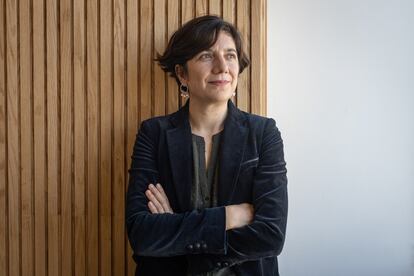Chile’s Minister of Science: ‘There is a public interest in developing a more advanced lithium industry’
Aisén Etcheverry, who was appointed to President Gabriel Boric’s cabinet less than two months ago‚ is one of the leader’s of the mineral-rich South American country’s National Lithium Strategy


On March 10, as part of President Gabriel Boric’s cabinet shakeup, Aisén Etcheverry became the third Minister of Science since the administration took office one year earlier. Unlike her predecessors, the 43-year-old isn’t a scientist or a lawyer and the bulk of her experience comes from serving under right-wing presidents — such as Sebastián Piñera — rather than center-left ones.
During Piñera’s first administration (2010-2014), Etcheverry was an official at the Ministry of Finance. During his second government (2018-2022), she was the executive director of digital transformation at CORFO, the state agency responsible for generating economic development. Subsequently, she was the director of ANID — the National Agency for Research and Development — responsible for promoting the development of science and technology.
However, despite her time with the Piñera administrations — and despite the fact that she doesn’t belong to a political party — Etcheverry is actually closer to the left than the right, aligned with Boric’s Broad Front party. For this reason it wasn’t a surprise when, in March 2022, the expert in intellectual property was assigned to coordinate inter-ministerial relations within the Ministry General Secretariat of the Presidency. By November of last year, she moved to preside over Chile’s National Innovation Council. And, after only a few months on the job, Boric called her and asked her to join his cabinet, as Minister of Science, Technology, Knowledge and Research.
Now settled in her office in downtown Santiago — which has an impressive view of La Moneda, the presidential palace — she tells EL PAÍS that she knows Boric well. As inter-ministerial coordinator, she accompanied him to almost all meetings with the various ministers in 2022. Even so, she was surprised by the president’s call, when he entrusted her with a very specific task: managing and implementing a new development model, which — with the contribution of science and technology — will manage to generate a better quality of life for the Chilean people.
Etcheverry has had to learn fast. Just a month after she assumed the post, the government unveiled its National Lithium Strategy, one of its most ambitious bets in terms of production for the country, in which the Ministry of Science is a key player. Together with the portfolios of Mining, Economy, Environment and CORFO, these institutions are charged with shaping the new Lithium and Salt Flats Science and Technology Institute. This research center will be located in Antofagasta, in the north of Chile, where the country’s largest salt and lithium reserves are located.
Question. What’s the mission of the new Lithium and Salt Flats Science and Technology Institute?
Answer. Its role is to generate new energy from lithium: adding value to the industry, improving extraction mechanisms and studying the salt flats. The institute will look at biodiversity, while taking into account the perspective of communities that live around the salt flats.
Q. Today, the state doesn’t have sufficient knowledge about lithium. The main players in Chile who deal with this metal are private enterprises. How are you going to bolster the government’s understanding?
A. Scientific development occurs when there are research groups at universities, specific research centers and the private sector doing R&D. It’s impossible for all these actors to be [part of a single institute]... but there must be a capacity to generate research through some collaborative work. We’re going to be doing this in the coming months.
Q. Most of the knowledge about the exploitation of lithium and the global trade networks is possessed by SQM and Albermarle, the main companies in Chile that exploit it. How does the Chilean government seek to access this knowledge and these networks? Especially as the administration is negotiating the nationalization of lithium…
A. We’re actually not part of the conversation [regarding the negotiations over control of the reserves]. Codelco [the National Copper Corporation of Chile, a state-owned mining company and the world’s biggest copper producer] has the mandate to do so in an independent capacity. There are technology transfer mechanisms associated with industrial property, which give value to that knowledge and allow it to be monetized.
Q. So, as Minister of Science, you’re not going to be part of the negotiations?
A. No. But the other space — which is the one that interests us the most as a ministry — is that, when you combine private interest with the public interest, you can develop technology not only to improve extraction methods or to comply with environmental standards. You can go further.
Q. In what way?
A. For example, by taking charge of the impact on biodiversity [caused by mining]. Or generating forms of exploitation that may be more consistent with certain worldviews associated with the communities that exist in the areas. The technological institute can [contribute a lot in this regard]. Perhaps SQM or Albemarle or another firm won’t be able to develop this technology, or they’ll want to outsource it and have others do the research for them.
Q. What this strategy seeks, as has been said, is to generate greater added value in the industry. Would that be in the form of refining lithium, or manufacturing batteries out of the metal?
A. The president was referring to participation in the entire value chain. Does it make sense to make electromobility batteries in Chile? Probably not, because those batteries are built close to where the car-manufacturing plants are. But perhaps it makes sense to develop stationary batteries, because we have significant energy production in the north from solar radiation. I would say that there is no industry that can be ruled out… [these activities] will have to be defined by the National Lithium Company [and by] Congress.
Q. To be clear about how added value would be generated, we will have to wait for the National Lithium Company to be approved and implemented, correct?
A. Yes, that would be the role [of the National Lithium Company]. And, in parallel, the new technological institute is going to do research [to support] more environmentally-friendly mining. That should be our number one priority. But, in addition to that, [our ministry] will administer competitive funds for scientific and technological-based ventures, which can be used for different purposes… [we may] see ventures associated with lithium and other metals.
The contracts that exist today include a mechanism that allows manufacturing companies based in Chile to sell lithium at a reduced price. Hence, if a person wants to make batteries, they can have a reduced price of lithium if they produce their batteries in Chile. There is a public interest in developing a more advanced lithium industry.
Q. Critics doubt that the state will be able to generate a value-added lithium industry, if the same has not been done with copper.
A. Many years have passed since we started the copper industry: this is a very different country today. In Chile, [it’s possible] to make very high-level technology. There’s a lot of space for investment and incentives. It’s also unfair to compare lithium with our copper strategy as they’re very different.
Q. Do you agree that the state has to be in charge of this industry?
A. Yes, absolutely.
Q. The idea that the state has to control lithium projects has spooked the private sector, which expected to have more of a leading role. Do you think there’s a risk that the debate ends up focusing on the issue of public versus private ownership, rather than the issues of added value and sustainability that concern your ministry?
A. This [debate] has been changing direction in recent weeks. I’ve been struck by the number of companies that are interested in starting conversations with the Chilean government [to become part] of our lithium strategy. We’re heading down a hopeful path, where the participation of the private sector is essential. But there’s also a public interest that needs to be protected, which has been done in other parts of the world. One can understand — based on the initial reaction — that [state control] was not what the private sector in Chile expected, but as the details become known and talks progress, the meaning of our strategy will be understood: we can all win.
Sign up for our weekly newsletter to get more English-language news coverage from EL PAÍS USA Edition
Tu suscripción se está usando en otro dispositivo
¿Quieres añadir otro usuario a tu suscripción?
Si continúas leyendo en este dispositivo, no se podrá leer en el otro.
FlechaTu suscripción se está usando en otro dispositivo y solo puedes acceder a EL PAÍS desde un dispositivo a la vez.
Si quieres compartir tu cuenta, cambia tu suscripción a la modalidad Premium, así podrás añadir otro usuario. Cada uno accederá con su propia cuenta de email, lo que os permitirá personalizar vuestra experiencia en EL PAÍS.
¿Tienes una suscripción de empresa? Accede aquí para contratar más cuentas.
En el caso de no saber quién está usando tu cuenta, te recomendamos cambiar tu contraseña aquí.
Si decides continuar compartiendo tu cuenta, este mensaje se mostrará en tu dispositivo y en el de la otra persona que está usando tu cuenta de forma indefinida, afectando a tu experiencia de lectura. Puedes consultar aquí los términos y condiciones de la suscripción digital.








































